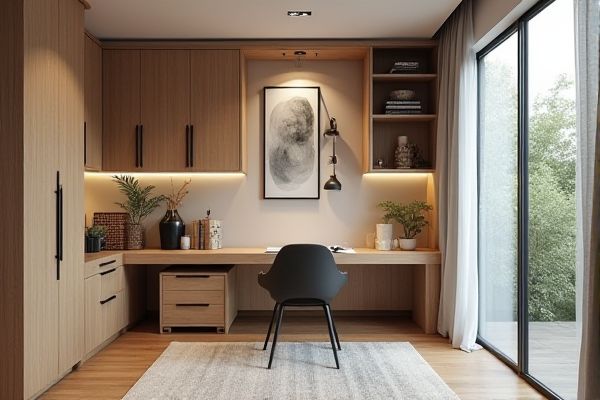
A compact study nook offers a space-saving solution with minimal distractions ideal for focused tasks, while a full study room provides ample space for multiple functions, including storage, technology setup, and extended work periods. Explore the rest of the article to discover which option best suits your productivity and living space needs.
Table of Comparison
| Feature | Compact Study Nook | Full Study Room |
|---|---|---|
| Space Requirement | Small, fits in corners or unused spaces | Dedicated room, requires larger area |
| Cost | Low to moderate | Moderate to high |
| Privacy | Limited, semi-private | High, fully private environment |
| Functionality | Basic setup with essentials | Comprehensive setup with storage and tech |
| Customization | Limited options | Extensive personalization |
| Noise Control | Minimal noise isolation | Effective noise reduction |
| Lighting | Natural or minimal artificial lighting | Optimal lighting with multiple sources |
| Usage | Short study sessions, quick tasks | Long study hours, complex projects |
Understanding Compact Study Nooks
Compact study nooks maximize small spaces by incorporating essential furniture like a desk, chair, and shelves within a minimal footprint, ideal for apartments or crowded homes. These nooks boost productivity by minimizing distractions and creating a focused environment while maintaining accessibility to materials. In contrast, full study rooms offer more space for additional equipment, storage, and seating options but require dedicated areas unsuitable for small living spaces.
Advantages of a Full Study Room
A full study room offers enhanced space for multiple workstations, promoting productivity through better organization and reduced clutter. It allows for ergonomic furniture setups and dedicated storage solutions, improving comfort and efficiency during long study sessions. The separation from common living areas minimizes distractions, creating a focused environment ideal for deep work and learning.
Space Efficiency: Nook vs Full Room
A compact study nook maximizes space efficiency by utilizing small, often underused areas like corners or closets, making it ideal for limited square footage without sacrificing functionality. In contrast, a full study room offers more freedom to incorporate larger furniture, extensive storage, and dedicated work zones but requires a significant portion of your home's floor plan. Choosing a nook optimizes vertical storage and multitasking surfaces, while a full room enhances comfort and separation from household distractions.
Furniture and Storage Considerations
A compact study nook requires multi-functional, space-saving furniture such as foldable desks, wall-mounted shelves, and storage ottomans to maximize limited space. In contrast, a full study room allows for larger furniture pieces like ergonomic desks, filing cabinets, bookcases, and ample storage solutions to organize books, supplies, and electronics effectively. Efficient storage options tailored to each setup significantly impact productivity and clutter management in both environments.
Design Flexibility and Customization
Compact study nooks offer limited design flexibility due to their smaller footprint but maximize efficiency with built-in storage and multi-functional furniture. Full study rooms provide extensive customization options, allowing you to tailor lighting, seating, and decor to match your specific work habits and aesthetic preferences. Choosing between the two depends on your space availability and the level of personalization you require for optimal productivity.
Productivity and Focus: Which Wins?
A compact study nook enhances productivity by minimizing distractions through a defined, personal space tailored for focused tasks, making it ideal for short, intense study sessions. Full study rooms offer ample room for varied activities, promoting long-term focus and comprehensive work with better organization and multiple functional zones. Overall, choosing between a study nook and full study room depends on the intensity and duration of study needs, with nooks excelling in concentration bursts and full rooms favoring sustained productivity.
Privacy Levels: Nook vs Room
A full study room offers significantly higher privacy levels compared to a compact study nook, as it is typically enclosed with walls and a door, minimizing distractions and external noise. A study nook, while space-efficient, often lacks sound insulation and clear separation from other living areas, which can reduce your ability to concentrate. Choosing between the two depends on your need for solitude and how much privacy you require for focused work.
Cost Comparison and Budgeting
A compact study nook offers a cost-effective alternative to a full study room, requiring significantly less investment in furniture, space, and decor. Budgeting for a nook typically includes minimal expenses such as a small desk, chair, and essential storage, while a full study room demands higher costs for larger furniture, lighting, and room modifications. Choosing a study nook maximizes limited space and reduces overall expenditure, making it ideal for budget-conscious students or remote workers.
Ideal Users for Each Study Space
Compact study nooks are ideal for individuals with limited space, such as apartment dwellers, students, or those who need a quiet corner for focused tasks like reading or writing. Full study rooms suit professionals, avid readers, or students requiring extensive storage, multiple work areas, and minimal distractions for long study or work sessions. Your choice depends on your space availability, work habits, and need for dedicated study zones.
Making the Right Choice for Your Needs
Choosing between a compact study nook and a full study room depends on your available space, budget, and work habits. A compact nook maximizes small areas with efficient storage and minimal distractions, ideal for focused tasks in tight quarters. Your decision should align with how much room you need for materials and movement, ensuring your study environment enhances productivity without overwhelming your living space.
 homyna.com
homyna.com